In the previous article, we addressed the causes, course, and prevention of dental bone loss. We have pointed out that you don’t need to worry if dental bone loss can’t be prevented because, with the help of a specialist, the process can be reversed. In this article, we briefly summarize what you have to know about dental bone loss and discuss in detail how to reverse this condition.
The main points of our article are the following :
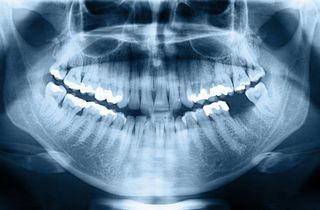
- About the causes and stages of dental bone loss, briefly.
- Medical help in stopping periodontitis.
- Reversing bone loss in teeth.
- How to reverse bone loss in teeth naturally: dental deep cleaning
- Required examinations and other information
About the causes and stages of dental bone loss, briefly.
As discussed in the previous article, dental bone loss is due to two main causes: loss of a tooth for any reason and a disease called periodontitis. Chewing and biting with healthy teeth encourages the jawbone to rebuild the bones. The lack of a tooth lost due to illness, an accident, or tooth extraction also affects its environment. The stimulus of chewing stops at the site of the missing tooth and the other teeth are burdened with more work. As a result of this already imbalanced state, atrophy of the bones surrounding the missing tooth may begin. Long-term, multiple tooth loss can lead to severe damage to the jawbone. The remaining, still intact teeth may migrate out of place, and the jawbone can collapse.
Medical help in stopping periodontitis.
In this article, we focus on the treatment of diseases related to dental bone loss with the help of a specialist. In this process, the patient has to be prudent, but lifestyle and hygiene are also extremely important. We have discussed this topic in detail in the previous article called preventing dental bone loss. First, we will talk about periodontal disease, and how it develops and advances.
What is periodontitis and how it develops?
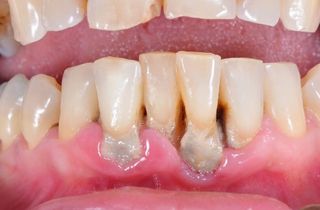 Early detection of symptoms plays an extremely important role in recognising and reversing periodontitis (or periodontal disease). Periodontitis is usually the result of a longer process. This means that the disease doesn’t develop overnight. The condition that precedes periodontitis is a disease called gingivitis. Gingivitis is usually caused by the accumulation of plaque-forming bacteria around the gum line as a result of improper dental care.
Early detection of symptoms plays an extremely important role in recognising and reversing periodontitis (or periodontal disease). Periodontitis is usually the result of a longer process. This means that the disease doesn’t develop overnight. The condition that precedes periodontitis is a disease called gingivitis. Gingivitis is usually caused by the accumulation of plaque-forming bacteria around the gum line as a result of improper dental care.
As the disease progresses, the bacteria also begins to damage bones and tissues that hold the teeth. Periodontitis is usually the result of untreated gingivitis. The gums pull back from the tooth surface due to tissue damage. More and more plaque accumulates on the small surfaces, and as the condition worsens, the bone also deteriorates. In the final phase, the teeth loosen and fall out on their own or they need to be extracted.
Early detection and treatment of periodontitis.
Symptoms of periodontitis may include the formation of gingival pockets, gum retraction, loose teeth, gaps between teeth, bad breath, and bleeding gums. Contact your doctor if you notice any symptoms. Recovery depends partly on individual features, the patient’s attitude, and at what stage of the disease the treatment is started. If the gum disease is diagnosed at an early stage, gingivitis can be reversed and treated easily. When periodontitis has already developed, the primary goal is to prevent the disease from reaching a level where it damages the tissue surrounding the bone or tissue around the tooth. If the disease has already started affecting the bones, there is no way to restore the original conditions. This is when dental treatments are needed.
Hygiene and other practices.
The proper attitude and active participation of the patient are essential in every phase of the disease. Keep in mind that if you follow dietary restrictions, dental care, and other lifestyle advice, you will make your doctor’s job and your recovery much easier.
The symptoms of gingivitis can be relieved with home remedies such as mouthwash that contains antibacterial agents. Some herbs have excellent anti-inflammatory and disinfectant properties. One of these is a strong decoction of sage, a few drops of mint, cloves, or tea tree essential oil in a cup of warm water.
Although, you should ask your dentist before using these herbal remedies, and of course, the professional treatment of periodontal disease should also be performed by a specialist. At this stage, home remedies can no longer help.
Unfortunately, no matter how promising these products seem, there is no toothpaste that can eliminate the symptoms of periodontal disease. Due to their antiseptic and anti-inflammatory properties, they can help prevent the disease and they are useful during aftercare. Your dentist can recommend you the best products.
Reversing bone loss in teeth
Advanced periodontitis or tooth loss definitely requires medical consultation. The specialist, after a thorough examination, will decide on a treatment with your consent. The treatment options are discussed in detail below. Thanks to modern dental cleaning and surgical interventions, dental bone loss can be reversed, and the process of bone reconstruction can begin.
Implants.
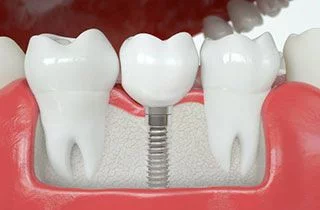 We mentioned that tooth loss does not only cause problems on the surface, i.e. in the oral cavity. Unfortunately, bone atrophy starts around the lost tooth. There are several medical tools available to replace dentures. The dentist can use bridges or make dentures. However, these solutions don’t reverse dental bone loss because they can’t replace the bone missing from the jaw. Studies show that neither bridges nor dentures stimulate the jawbone enough. Thus, they can’t reverse dental bone loss.
We mentioned that tooth loss does not only cause problems on the surface, i.e. in the oral cavity. Unfortunately, bone atrophy starts around the lost tooth. There are several medical tools available to replace dentures. The dentist can use bridges or make dentures. However, these solutions don’t reverse dental bone loss because they can’t replace the bone missing from the jaw. Studies show that neither bridges nor dentures stimulate the jawbone enough. Thus, they can’t reverse dental bone loss.
Implants provide a great solution because the professionally made replacement tooth is attached to the jawbone with an artificial root made of extremely durable titanium alloy.
The professionally inserted implant can stimulate the jawbone as much as a healthy tooth does. Thus, stimulation by chewing and biting can continue, making it easier for the bones to form. Placing the dental implant is a minor oral surgery. However, there is no need to be afraid of it: the procedure is less demanding than a tooth extraction. Dental implantation is usually performed under anaesthesia in the dental office. After the surgery, the wound is sutured, which can be removed after 7-10 days or dissolved on its own.
Bone grafting.
When a significant amount of bone mass is lost, bone grafting might be needed using material from the patient’s body or an artificial substitute before the placement of dental implants. During bone grafting, the bone missing from the jaw is replaced with material from the patient’s body or an artificial substitute. If the patient’s body accepts the material, new bone formation can begin and the jaw can become strong again. Bone grafting is ideally able to reverse dental bone loss. It usually takes 3-6 months for this process to finish. Proper healing after surgery is extremely important. We have discussed bone grafting in detail in many of our previous articles.
GTR: Guided Tissue Regeneration
When periodontitis causes substantial connective tissue and bone loss, it may be necessary to perform GTR, i.e., guided tissue regeneration. Periodontal regeneration can only begin after inflammation has been treated. Since gums regenerate quickly, a thin membrane is placed between the gums and the bone. The function of the membrane is to keep the unwanted tissue away and to provide sufficient space for the periodontium to regrow.
Periodontal regeneration with growth factors.
Another method of bone tissue regeneration in addition to GTR is to stimulate the regeneration of the jawbone with growth factors. The goal is to regenerate the jawbone, especially the tooth sockets, as quickly as possible. Growth factors are released directly into the root surface.
How to reverse bone loss in teeth naturally: dental deep cleaning
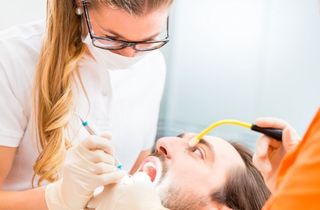 Dental deep cleaning, root planing, and scaling are routine medical procedures that remove bacteria, plaques, and dental calculus from under the gums. As part of the diagnosis of gingivitis, your doctor will deep clean your teeth, which can prevent periodontal disease. Thanks to deep dental cleaning, dental bone loss can be reversed if it’s still in the early stages. You don’t need local anaesthesia for deep dental cleaning, but it’s recommended to find a specialist because the gums will feel tender after this treatment. The length of the treatment depends on the area that needs to be cleaned and the severity of the gingivitis, but it shouldn’t take longer than 10-20 minutes.
Dental deep cleaning, root planing, and scaling are routine medical procedures that remove bacteria, plaques, and dental calculus from under the gums. As part of the diagnosis of gingivitis, your doctor will deep clean your teeth, which can prevent periodontal disease. Thanks to deep dental cleaning, dental bone loss can be reversed if it’s still in the early stages. You don’t need local anaesthesia for deep dental cleaning, but it’s recommended to find a specialist because the gums will feel tender after this treatment. The length of the treatment depends on the area that needs to be cleaned and the severity of the gingivitis, but it shouldn’t take longer than 10-20 minutes.
After cleaning, the dentist will use and recommend using antibacterial gel and chlorhexidine on your teeth. These products will speed up the healing process. If necessary, the treatment should be repeated every 4-6 months. Thanks to deep dental cleaning, the gums will be able to reattach to the teeth. This stops the inflammation and reverses dental bone loss. Read about natural ways to build bone density
Required examinations and other information.
In addition to periodontitis and tooth loss due to other causes, bone loss can be triggered by other diseases as well. Early diagnosis and the treatment of the underlying problems play an important part. We discuss some of these in detail below.
Az osteoporosis.The definition of osteoporosis and its connection with dental problems.
Osteoporosis is basically the consequence of hormonal imbalance, aging, genetics, and a poor lifestyle. Due to osteoporosis, the quality, density, and functionality of the bone decreases. Bones become more vulnerable, they break more easily and they don’t regrow. Osteoporosis affects not only the teeth but the whole body. The treatment requires a thorough examination. Unfortunately, excessive intake of fluoride, which is used in oral hygiene products, also causes osteoporosis. Therefore, you should be careful with products that contain fluoride. In addition to providing a protective layer, you should avoid swallowing toothpaste, and fluoride toothpaste is not recommended for children under 10.
Preventing and treating osteoporosis.
With a proper lifestyle and a healthy diet, we can maintain the health of our teeth and preserve the strength of our bones. Regular exercise is very helpful in preventing and treating osteoporosis. Some minerals and vitamins play an extremely important role in reversing osteoporosis and thus, dental bone loss. Keeping a diet rich in calcium and magnesium is crucial, but you can take vitamin supplements as well if necessary.
You also need vitamin D3 for proper calcium absorption. Recent studies have shown that essential fatty acids and antioxidants also have a beneficial effect on bone formation. Among vitamins, we highlight the importance of vitamins E and K. Ask your doctor about the proper intake of these vitamins and minerals. Hormone replacement therapy might be required in severe osteoporosis.
Diabetes.
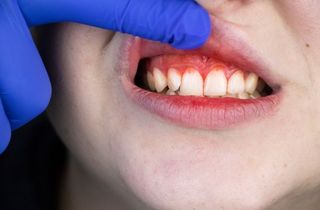 Medical research has shown that people with diabetes are three times more likely to be affected by periodontal disease. The main reason for this is the reduced blood flow to the gums, which predisposes to the development of inflammatory gum diseases. With diabetes, it is especially important to control sugar levels, to have a healthy diet, more careful dental care, and more frequent dental check-ups. The periodontal disease itself changes blood sugar levels, so the two diseases mutually affect each other. Inflammation associated with periodontal disease reduces the effect of insulin, which in turn increases blood sugar levels. This process makes it significantly harder to control blood sugar levels for a person suffering from periodontal disease and diabetes. On the other hand, people with periodontal disease are more likely to develop diabetes than those with healthy gums.
Medical research has shown that people with diabetes are three times more likely to be affected by periodontal disease. The main reason for this is the reduced blood flow to the gums, which predisposes to the development of inflammatory gum diseases. With diabetes, it is especially important to control sugar levels, to have a healthy diet, more careful dental care, and more frequent dental check-ups. The periodontal disease itself changes blood sugar levels, so the two diseases mutually affect each other. Inflammation associated with periodontal disease reduces the effect of insulin, which in turn increases blood sugar levels. This process makes it significantly harder to control blood sugar levels for a person suffering from periodontal disease and diabetes. On the other hand, people with periodontal disease are more likely to develop diabetes than those with healthy gums.
Others.
In addition to osteoporosis, other diseases can also cause bone loss. For example, major surgeries, taking anti-inflammatory steroids, cirrhosis of the liver, Crohn’s disease, cystic fibrosis and various hormone-deficiency diseases are to blame.
In our article on reversing dental bone loss, we discussed the process of dental bone loss with the help of a professional. We want to emphasise that dental bone loss reversal is not hopeless, even in severe cases. However, we have pointed out that in addition to home remedies, the effective reversal of dental bone loss always requires professional medical assistance, thorough examination, and proper intervention.

